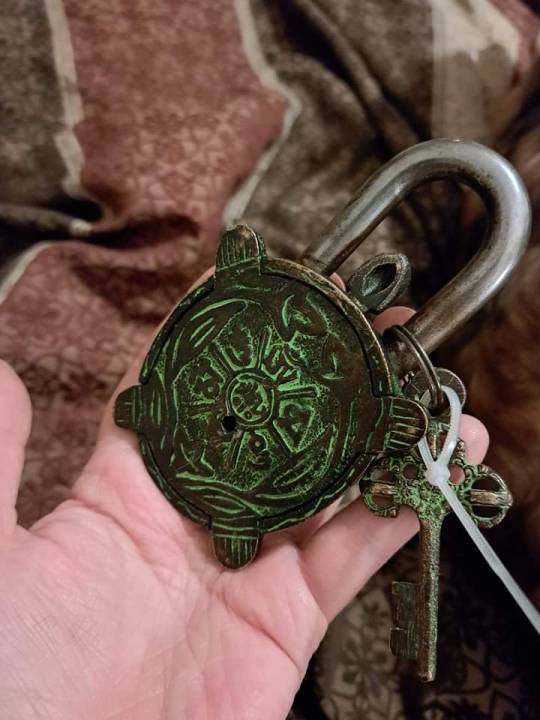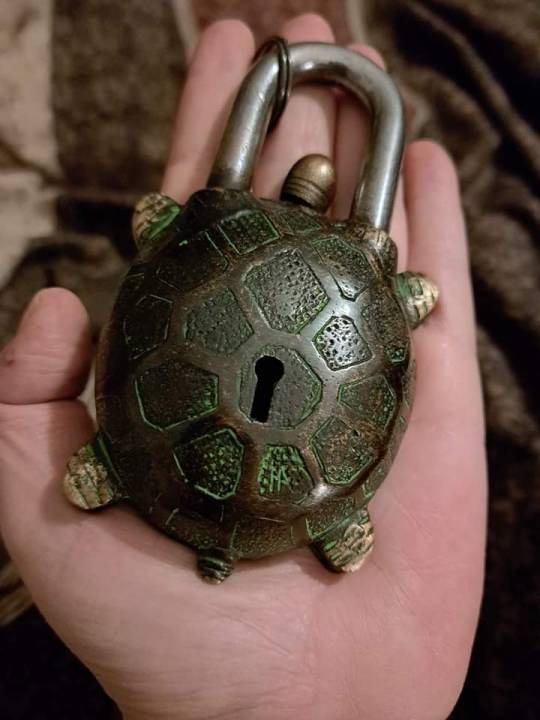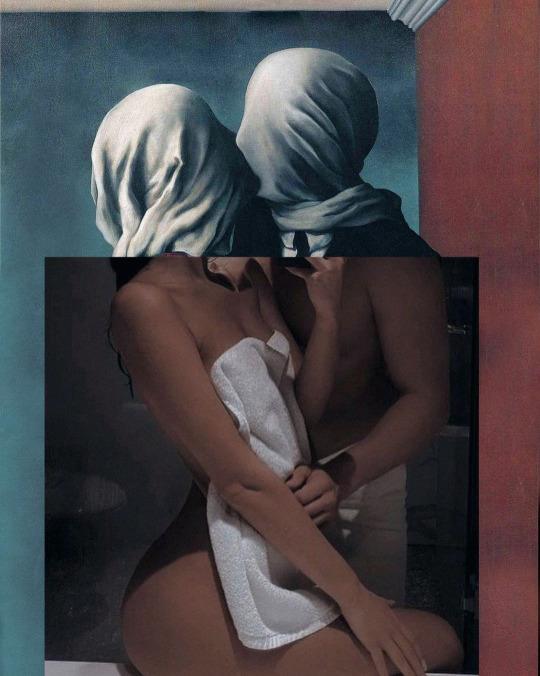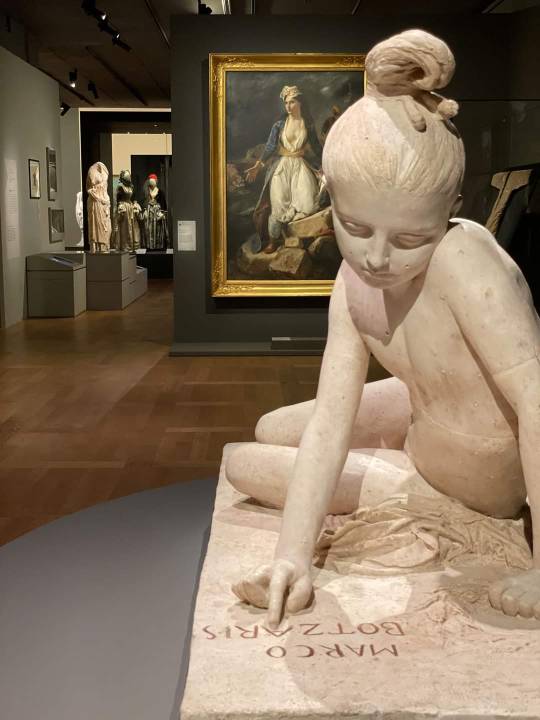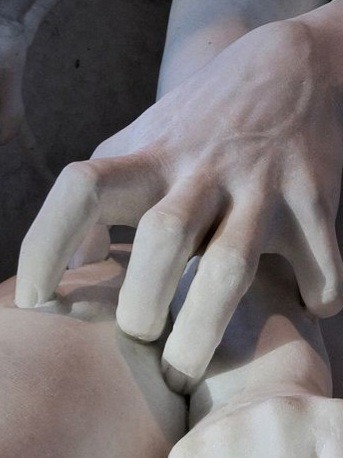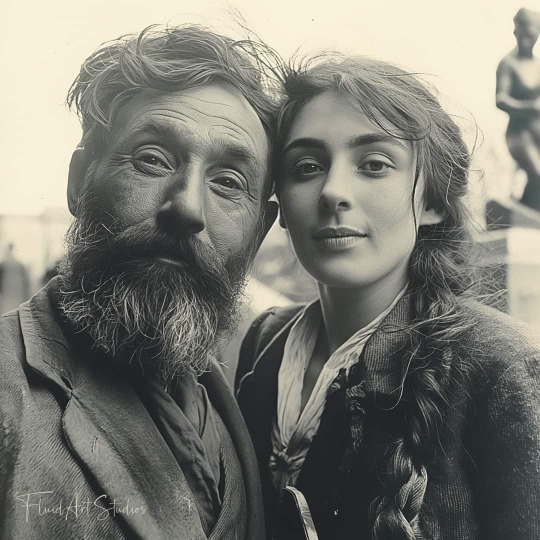Text

Domenico Piola
Liberation of St. Peter
Pen and brush in brown, squared with red chalk, 21 x 30.7 cm, 17th century
13 notes
·
View notes
Text

Ho chiuso gli occhi e ho chiesto un favore al vento:
porta via tutto ciò che è inutile.
Sono stanca di valigie pesanti.
Da adesso in poi solo ciò che entra nelle tasche e nel cuore.
C.Coralina
115 notes
·
View notes
Text

Richard Avedon Theoretical Physicist J Robert Oppenheimer, Institute for Advanced Studies, Princeton, New Jersey 1958
"Despite the vision and farseeing wisdom of our wartime heads of state, the physicists have felt the peculiarly intimate responsibility for suggesting, for supporting, and in the end, in large measure, for achieving the realization of atomic weapons. Nor can we forget that these weapons, as they were in fact used, dramatized so mercilessly the inhumanity and evil of modern war. In some sort of crude sense which no vulgarity, no humor, no overstatement can quite extinguish, the physicists have known sin; and this is a knowledge which they cannot lose." J Robert Oppenheimer, 1947
13 notes
·
View notes
Text
The dog, man's best friend 🤔😍♥️🤣
Il cane, il miglior amico dell'uomo 🤔😍♥️🤣
9 notes
·
View notes
Text
Good afternoon TUMBLR - April 27th - 2024
''Mr. Plant has owed me a shoe since July 5, 1971."
Atyrau Kazakhstan – Dec 2004 – Oct 2010 - Kashagan Development Project
Part 8
GIUSEPPE DI VERIO
Giuseppe was a young engineer from Sicim SpA in his first experience abroad. Genoese, small and hairless at a young age. The winter had frozen the Ural River, and many locals sat in the middle of the river with their stool, cut a small hole in the ice and patiently began fishing. Or, to avoid making a long trip to reach the bridge, they crossed the river directly from one bank to the other. It was easy to follow the routes during the day, but when evening fell, crossing became dangerous.

One evening, leaving the gym he attended, Giuseppe thought: ''But why do I have to walk almost a kilometer with this freezing cold when if I cross the river - like everyone does - I can reach home in ten minutes? And so he did but… not seeing clearly the trail where others had passed, he decided to cut straight ahead. The ice broke and Giuseppe - with an external temperature of -23 C - ended up in the water! His luck was that two fishermen were sitting not far away: they came to Giuseppe's rescue, pulled him out of the water and carried him bodily to the River Palace hotel which is just opposite. Upon arrival at the hotel Giuseppe's clothes had already solidified. A hot shower helped him recover, and everything went well. From that evening onwards, Giusepppe always used the bridge to cross the Ural.
CHEWING GUM
It was a couple of weeks after Giuseppe's unseasonal swim in the Ural when he went to an IDEAL supermarket. It is a very popular chain in Kazakhstan, owned by one of the President's daughters. Giuseppe took some snacks and fruit from the shelves and then went to the cash. Near the checkout, as in all supermarkets, there were packs of chewing gum, and while the cashier tapped the purchases, Guseppe took a couple of packs of chewing gum and - thoughtfully - put them in the pockets of his jacket!!!. This didn't went unnoticed by security guard stationed near the cash register, who catched on Giuseppe, twisted his arm and ordered to follow him to the management office. Once they entered the office - with Giuseppe not understanding the reason for all this action, the Director told him to empty his pockets. And here comes the chewing gum!!! In his limited English the Director asked Giuseppe where he had gotten the chewing gum – and Giuseppe realized what he had done, unconsciously. He tries to apologise, stating that after a day of work it can happen that a person commits an action without realizing what he is doing. But the Director wouldn't hear of it, and said:
Do you realize the crime you are guilty of? You tried to steal property from our President's daughter!!!! It's unforgivable!
But no…I'm willing to pay for the chewing gum…even double if you want, Director!
No…this is a crime that must be punished, replied the Supermarket Director.
Upon the police arrival, the poor victim was interrogated and the report drawn up, which Giuseppe had to sign. The guy was summoned for a preliminary hearing at the Atyrau Court in three days' time. After speaking with his Company's lawyer, he board the plane to Istanbul the next day: goodbye Kazakhstan!
ITALIAN PRIME MINISTER AND MINISTRY OF FOREIGN AFFAIR VISIT KAZAKHSTAN.
In October 2007 there was a visit to Kazakhstan by Mr. Prodi and Mrs. Bonino (In my opinion the worst Foreign Minister that Republican Italy has had (until the advent of Di Maio). AGIP invited us to the official ceremony that would be held in their training center in Atyrau. Director Borchia and I went and I can assure you that I never assist anything pathetic like that in my life. The stage with the authorities was occupied, in addition to our Ministers, by the highest Kazakh regional authorities. All of them wearing headphones, given that "our" people would be making their speech in Italian.
Bonino began (badly) and said something like:
Today I had the opportunity to fly in a helicopter over the artificial islands on the Caspian Sea from where the oil will be extracted…nothing that even remotely resembles to island of Capri or even Ischia…this should push you to try to finalize the project as soon as possible, so you can return to Italy to your families. (All Kazakhs looked at each other wondering ''What the f*** she is talking about?')
Then it was Prodi's turn who, to ''smooth the hair'' of the Kazakhs, began the speech with a courtly phrase:
When I first visited Kazakhstan……Astana was a dream in the fervent imagination of President Nazarbayev……now this dream has become reality……(and so on).
All with a tone of voice that - I have the photos to prove it - caused more than half of the bystanders to sleep. I understood then what Prodi's true strength was: he took everyone for exhaustion!

The locals, meanwhile, continued to make faces that indicated their embarrassment and surprise as the translation of what was said reached their ears. In short, the classic figure of s**** that Italian politicians regularly make at International level. Then we play surprised to understand Italy counts 0 in the global context. Even the buffet that followed the speeches was disgusting.
APRIL 2007 - REMO AND MENTORE ROAD ACCIDENT.
It was an October Sunday morning. like many others. Remo, our Chief mechanic, called 'Mentore and asked him if he wanted to accompany him to the Koktem supermarket, the only one where Italian brand peeled tomatoes were available. The two set off with the Lada Niva towards the supermarket.

Arriving at the intersection at the end of Satpayev Avenue - which at the time did not have an overpass - they waited for the green arrow to appear on the traffic light to turn left. At that moment, coming from the airport, a bank armored vehicle arrived at high speed and hit the Lada Niva. The impact was devastating: the Niva was thrown 70 meters away, overturning several times. Mentore died instantly, Remo was pulled from the wreckage with multiple fractures all over his body and taken to the nearby hospital. Some of us saw a sign of destiny in what happened: Mentore had just returned to Kazakhstan after a long absence. Remo remained in hospital for two weeks and then convalesced in his apartment. Following the incident, the police withdrew Remo's passport, saying they would return it once the investigation was concluded. Mentore's body was preserved in the local morgue for two months before permission was given for repatriation. Once able to move, Remo was asked by the police to go to their headquarters 2 times a week, to be subjected to the same exhausting questions:
Why were you at that intersection that Sunday morning?
I was going to the Koktem supermarket
Why did you go to the Koktem supermarket? There are many of them in Atyrau.
Because it is the only one who sells Italian-made peeled tomatoes.
And why do you need Italian-made peeled tomatoes? Kazakh-made peeled tomatoes are also good.
I'm not saying that Kazakh peeled tomatoes are not good, but I prefer the Italian ones.
Why do you prefer Italian peeled tomatoes?
……….
And so on for six months.
At the conclusion of the investigation, the police issued a report in which the bank vehicle was cleared of any responsibility, saying that the primary cause of the accident was the maneuvering of the Lada Niva driven by Remo: he didn't waited for the green arrow and had trun left cuttin road to arriving vehicle.
Remo was fined $9,000, and only after paying he got back his passport.
ALVARO BRAVI
Alvaro was a retired guy, one of those who ''never want to give up''. He was a man of great experience, so we had called him to Kazakhstan to give an hand to the project. Bravi had been very ill, but he had overcome all the difficulties, even though he had to be very careful with his diet. One evening he felt very ill, so an ambulance was called and he was admitted to the SOS International clinic. I went to see him and I was very impressed: he waspale and washed out, and he seemed to have suffered a lot. I spoke to clinic director, a middle-aged English woman of ''stocky'' build. She told me that Alvaro suffered from intestinal blockage, aggravated by the previous operations he had undergone. She also told me that in Kazakhstan they couldn't do much, and she strongly recommended airlifting the patient to their clinic in Vienna, Austria.
Airlift cost? I asked
84,000 dollars – was the answer.
Well, I'll let you know – I told her, taking my leave.
I spoke about the matter with my Director, who decided to take an heavy responsibility:
Tomorrow we'll send Bravi to Italy by normal scheduled flight, Business class, via Istanbul – Rome – Bologna. We will notify his family in Italy so that upon arrival there will be someone to take care of him, immediately transferring him to the hospital in Forli', where he lives.
So it happened. When Alvaro arrived at Forli' hospital, the doctors, after having examined him, they submitted the patient to a powerful enema. The next day Alavaro was already up and asking to return to Kazakhstan.
0 notes
Text
Good afternoon TUMBLR - April 27th - 2024
''Mr. Plant has owed me a shoe since July 5, 1971."
Atyrau Kazakhstan – Dec 2004 – Oct 2010 - Kashagan Development Project
Part 7
PROJECT PROGRESS.
AGIP was unexpectedly named ''Sole Operator'' by the members of the Consortium, namely SHELL, EXXON, IMPEX Japan, ConocoPhillips, KazMunayGas Kazahstan, as well as ENI. It seems that what tipped the scales in favor of the Italian group was the substantial stalemate and crossed vetoes by the large American groups, and the vote in favor of the Kazakhs of KazMunayGas.
However, the project was generally going badly: many aspects had been underestimated and AGIP was continually under pressure from the other members of the Consortium. Big inconsistencies began to emerge between spending forecasts, implementation times and what the progress actually was on the ground. A budget of 30 billion USD will ultimately be matched by a bill of 52 billion USD. The duration of the construction was earlier estimated at 3 years, and instead the so-called ''firts oil in'' occurred after 7 years. Two factors contributed most to the extension of the duration of the works:
The impact of the Kazakh winter was underestimated, which practically prevented to work for almost 6 months of the year.
The planning of the artificial islands off the coast of the Caspian Sea was rejected by Lloyd's of London, who refused to insure the project as it was conceived. The proximity of the artificial sleeping quarters island to the crude oil production island was considered too dangerous. In the event of an emergency, the lethal H2S contained in a very high percentage in the oil of the field would have killed all the people present.

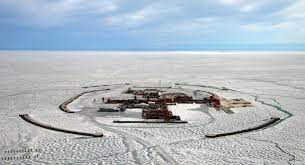
Artificial islands in summer and winter.
CHRISTMAS 2007.
The Ccompany dinners (prural) to celebrate Christmas began around December 10th. I didn't like taking part but my role required it. I couldn't refuse the invitations and I also had to perform the inevitable ''toast''. My turn, as sual, came after the fourth or fifth glass of vodka, so I can't remember exactly what I said. The warm applause I received once the ''toast'' was finished indicated the grat level of rhetoric I had reached. That year the party organized by our Client, the Israelis of BATEMAN. The reception took place at the Renaissance, a luxury hotel that had been open a few months earlier.

The large dining room was packed with guests, including the most important authorities of the city. At a certain moment, without anyone having warned us, the lights were dimmed and a procession of 6 people entered the room. They were all wearing traditional ultra-Orthodox Jewish costumes with strange headdresses. They brought with them ''sacred'' objects such as their candelabra, some small boxes (later they told me they contained sheets of paper with passages from the Torah), the Mezuzah, a sort of inlaid tube also containing passages from the sacred scriptures and finally a kind of altar. Now it must be clarified, as I have done on other occasions, that Kazakhstan is still a Muslim country. A religious function - unannounced and lasting at least 30 minutes - in the middle of a dinner with guests of different religious denominations, well I believe it was a mistake by BATEMAN Management.
All of us - ''the others'' - witnessed in disbelief what was happening before our eyes: gazes met and only one question could be read in the eyes of the bystanders:
''But what are they doing''?
Finally the ceremony - made up of incomprehensible - for us - words and incense thrown on the altar - ended and therefore the glacial and embarrassed silence that had descended on the room ended.
WINTER 2007-2008

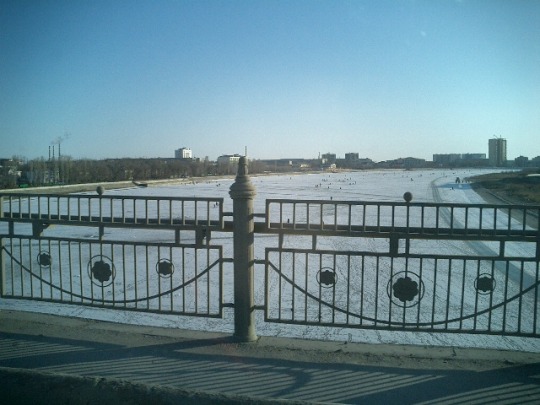
The climate of the Atyrau region is influenced by the proximity of the Caspian Sea. Winters are very cold, but snowfall is scarce. The winter of 2007-2008 was an exception, with abundant and sudden rainfall brought by the wind whose name is ''Buran''. As part of the assistance that AGIP provided to the population living around the plant, we were asked to clear the snow from about twenty kilometers of the road that connected the village of Iskynisky to the state road. The village stood next to a pond where oil emerged, so a tank sent by AGIP collected 7 barrels of crude oil every day, which were paid to the local community at the end of the month. To warm up and cook food, the inhabitants of Iskynisky used to go to the pond with a bucket, took some oil and then used it in their home stoves: almost all of them had black faces from the fumes caused by the combustion of crude oil. We arrived at the village with our equipment after two days of work: the road was finally cleared from snow therefore supplies could reach the village again. The Akim (mayor) thanked us but then told us:
The small village school is located right under the embankment where the water tank is at the top. When the thaw occurs, all the water produced ends up in the school, and therefore lessons are suspended for days. Since you are here with shovels and excavators, could you please dig a trench along the school building to protect it from flooding?
Of course, Mayor – said Pennacchia. Within a few hours the trench was dug.
The mayor and the entire population - about a hundred people - couldn't stop thanking us, and we had to promise to return in the spring for a big shashlik. (BBQ).
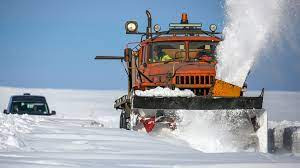
DOSSOR
But the troubles weren't over that winter. AGIP called us again a couple of weeks after the happy conclusion of the Iskynisky episode. In Dossor, a town 100 km east of Atyrau, a big problem had occurred: the water supply was frozen, and the inhabitants had been cold for days. We arrived there and saw a fairly desperate situation. The population, in an attempt to de-ice the pipes, had done all sorts of things: there were buildings whose walls were completely black because old car tires that had been accululated and set on fire.
We realized that the problem could be solved by digging a trench about a kilometer long and burying a new pipe to bypass the area where the existing pipe had frozen. Manpwer and eqipment were sent and within 48 hours, even working at night, the new pipe had been installed. The water service resumed, so even the small neighborhood gas plants that provided hot water to the inhabitants began to function again, even if not at 100%. The Mayor summoned us to the town hall and congratulated us on behalf of the entire population. The Mayor, however, was a great hockey fan, and therefore asked us to prepare a rink so that the scheduled regional championship match could be played regularly on Sundays. We couldn't refuse, the equipment were still in the city, and it took little to outline an area that the Mayor immediately made available. The AGIP representative who was with us - he called the Atyrau office and asked them to send at least a dozen tanks with hot water. Yes, because – I discovered it there – to make an ice rink you need HOT water! On Sunday morning everything was ready, and the tanks arrived. The population saw the tanks and thought that they were intended for their consumption. When they saw that the water was thrown on the ground to obtain ice, they immediately became very angry and attacked the trucks. The drivers were thrown from the trucks, and people shouting slogans against the Mayor (the locals translated unrepeatable words to me…) took possession of the tanks which were taken - rightly I would say - to supply houses and condos We could leave the city quietly.
BATEMAN'S ESCAPE
In our section of the project, work's progress was quite good, with a monthly turnover constantly above 3 million USD. But something was going wrong, and at the halfway point of three years of activity an unprecedented surprise awaited us.! It was a morning like any other, my collegue called me by phone from the site, asking to reach him urgently. Once there, Franco told me that no BATEMAN people could be found at site.
Sorry I can't understand: you mean no Israelis are here?
Nobody, I search around, I try to call by phone … there's none of them, and no one answers the phone.
Well – I said – let's go to their offices.
We then went to BATEMAN site offices, but it was closed! We returned to site and asked an Indian employee of BATEMAN what had happened to the Israelis.
Sir – he told us – this night in the camp we heard cars being started, tires screeching on the gravel, and looking out the windows we heard that a group of about 10 cars and minibuses were leaving the compound. This morning in the canteen we realized that no Israelis were present, Sir! We came to the site anyway, but there is no supervisor with us.
We were amazed! We didn't know what to think, so I called my Director to see if he knew what had happened. Giorgio fell from the sky, and asked us to investigate further, in the meantime he would try to find out about what happened. Within a couple of days the truth came out: all of BATEMAN's Israeli management and technicians had left Kazakhstan on board the first plane in the morning, leaving for Amsterdam. All Company's bank accounts held at local banks had been drained, and as far as we were told, they left behind $92 million in debt! We immediately asked for an urgent meeting with AGIP, because we literally needed to know what to do: our direct Client no longer existed, and beyond the credits with BATEMAN we needed to understand if AGIP intended to take over from the Israelis and assume direct control of the ongoing project. The meeting took place three days after the ''great escape''. AGIP reassured us that their legal department was working to prepare an addendum to the contract, whereby we would become AGIP's "Direct Contractor".
The story, however, was not so simple. Practically more than two months passed before the whole matter was settled (in line with AGIP's turtle timing). In the meantime, which was certainly not easy, we worked without receiving a penny for three months. Eventually, after three levels of judgement, our Company managed to be compensated for all the outstanding credit with BATEMAN. Their Management attempted unsuccessfully to bring the case to a UK London court. In the end our Director was able to say with satisfaction ''I am one of the few guys who succeded to get money from Israelies''.
0 notes
Text
Good afternoon TUMBLR - April 27th - 2024
''Mr. Plant has owed me a shoe since July 5, 1971."
Atyrau Kazakhstan – Dec 2004 – Oct 2010 - Kashagan Development Project
Part 6
SAFETY
The so-called ''Safety'' or ''Safety'' or HSE (Health, Safety & Environment) became a very important issue within the Oil & Gas industry starting from 1992.
Before this date there was only one Safety representative at site. Since 1992, an era began in which safety representatives became more and more numerous and took more power in the construction management. From the 2000s onwards the British, who had always been the dominant ''caste'' in the HSE, managed to deliver a masterstroke: legally they became ''consultants'' for security, thus freeing themselves from all the possible civil and penalties in the event of an accident.
It was enough for them - and it is a relatively easy thing - to demonstrate in some way that ''we had we have notified you in writing that accident could happen'' (with emails, letters, meeting reports, etc.) to ensure that the representatives of HSE will remain out of all legal proceedings or to be claims for compensation from accident victims, or their relatives. Hence the multiplication of documents that the Contractors must draw up before starting any activity, such as work permit, risk assessment, daily checks before accessing scaffolding, entering confined spaces (tanks, vessels etc.). In short, a real ''job within a job'' which for the most part does not serve to prevent accidents, but only to provide a salary to a plethora of people.
The Kashagan Development Project was no exception to this rule: dozens of British wandering around the plant uselessly, bothering those who worked, looking and creating for opportunities to justify their presence.
During one of these rounds, a British Safety supervisor was passing under the main Pipe rack, a 5-storey steel structure, where a local company was erecting scaffolding. As bad luck would have it, a scaffolding pipe measuring around 3 meters fell from above at that very moment, sticking into the ground 3 or 4 meters away from the British guy!
Open up Heaven!! Works were immediately suspended all the workers were told to get off the site and identified. Than general inspection of the scaffolding and structure, photos, videos, reports were made. Following the preliminary report, AGIP decided to set up an inquiry commission to shed light on the incident. After 3 weeks, a real trial was implemented, complete with a Judge (an AGIP representative), a prosecutor (a representative of the HSE), a defense lawyer (a representative of the Sub Contractor) and witnesses for the prosecution and the defence.
All to arrive at a ''Solomonic'' sentence in which generic instructions were provided on ''how to avoid this type of accident from happening again in the future''.
A real joke, as well as an infinite waste of time.
FATAL CASUALTIES
Unfortunately, during the course of a large project like Kashagan - 12,000 people were working at its full swing - three fatal accidents occurred. The victim of the first was a young Kazakh who worked for the Italian SICIM. The company was building the underground system in which it had to install large carbon steel pipes. The trench for the pipes was up to -3.70 meters deep. Unfortunately during the installation phase they forgot to weld the ring for cathodic protection. The Supervisor thought of returning to the site during the lunch break, re-digging the trench, welding the ring with the connected cable and then closing the excavation without the Works Management noticing anything. While the welder was working on the bottom of the excavation, the trench walls collapsed, burying the poor man. When his colleagues managed to extract him from the trench he had already stopped breathing.
The second accident also happened to an employee of SICIM Italia. A large pit, more than 4.00 meters deep, had been dug to house a concrete chamber where various pipes coming from the plant's sewage system would have been connected. The sides of the excavation were protected by the so-called sheet piles - a sort of iron armor connected to each other, forming a solid barrier. On one side of the excavation, a crane conrete counterweight were installed, since there were not enough sheet piles available, stacked on top of each other to form a somewhat unstable barrier. It may be that the vibrations of the ground caused by the excavators present around were at the origin of the collapse of one of the heavy concrete slab: the fact is that there was no escape for a worker who was working at the bottom of the excavation.
The third accident involved an Indian worker. At that moment he was working on installing scaffolding around a vessel, about 45 meters from the ground. The fall gave him no escape. Eyewitnesses reported that his gesture was a voluntary, considering that his body did not have the safety belt with which scaffolders secure themselves to the structures they work on. Personally, I believed that the conclusions of the inquiry commission were drawn to minimize the compensation due to the victim's family.
PETROVSKY RESTAURANT.
A new restaurant had opened in the city center. Petrovsky had a nice decor, passable food. They put on a bit of air: the cloakroom service at the entrance because in winter customers arrive decked out as if for a mission to North Pole. Saturday nights were always sold out, most of the expats dined there. One of those Saturday evenings we had ''betrayed'' our friend of Venezia restaurant, and we were at dinner at the Petrovsky. The entire HSE British team was present. The guy who had been grazed by the scaffolding pipe around 9.00 was already dead drunk, like most of his friends. Suddenly he got up from the table and staggers towards the cloakroom, managing not to fall when he walk down the three steps that separate the dining room from the large entrance hall. Having reached the cloakroom door, the guy dropped his zip and started urinating directly on the coats and under the astonished gaze of the cloakroom attendant!! Which she didn't know what to do! As luck would have it, the two bouncers of the club, who had just returned to warm up a bit after the freezing cold and the wind that was blowing outside, reacted promptly, lifting the British guy (who was also tall but with that thinness typical of an alcoholic at last stage) and they throw him in the toilet, right next to the wardrobe!!
The entire restaurant room had witnessed the tragicomic scene, and now the restaurant manager urged the imbecile's cronies to take care of him and leave the restaurant as soon as possible.
CRATE LIFTING 5 large pumps had been installed and aligned and Client urged us to protect them from the harsh meteo by covering them with the original wooden crates. It was afternoon and I witnessed the operation coordinated by Mr. Longo: our 21 ton Bendini crane, using steel ropes which in jargon are called ''sausages'', easily lifted the crates and placed them on top of the pumps. The ''sausage'' is so called because it is a sort of ''sock'' that protects the steel cables, and has a pinkish color. In the middle of the sausages there is an opening from which a card protrudes with the characteristics of the steel cable itself: max capacity, date of the last test, etc. It is true that when seen from distance the opening it could be mistaken - by a non-expert - for a defect in the sausage, almost as if it were going to break at any moment. But the British safety supervisor should have known that the opening was not a ''defect'' at all................
Well the guy from afar started running towards us, shouting to stop the lifting immediately and placing his arms in the characteristic ''cross'' position which in Safety language means ''STOP'' the operation being carried out . Mr. Longo and myself looked at each other and I read the typical Sicilian question in my colleague's expression: ''What the f*** does this guy want''? Once the HSE guy reached us, he continued to yell, essentially saying to lower the crane and put the wooden crate that was hanging from it on the ground. I ordered the crane operator to carry out the maneuver and then, gathering all the patience I was capable of, I prepared to explain ''the mystery'' to that stupid guy. Yes, because as well as being stupid, these individuals were also touchy: if found in obvious fault, one should never exaggerate in confronting them with their obvious inabilities, but rather act with circumspection and make them understand that their behavior was wrong and devoid of foundation. Once the crane was lowered and the cut in the sausage was made available to view, I showed that skittle head the plate with the characteristics of the lifting cables written on it.
As you can see – I said, pronouncing the words with the utmost condescension – the cut in the sausage is made in order to be able to read the safety plate, it is not a defect that affects its lifting capacity.
Aahh…yes…of course…of course I know (the donkey had immediately recovered from the blunder) but in fact…I just wanted the crane to lower the load so I could check that everything was OK!!
Of course?!! I said – it is part of your right/duty to check at all times that we operate in total safety!
It all ended like this, with the usual pats on the back, plus the hackneyed phrases about ''Safety First and Safety is our goal'' bla ...bla ....bla....
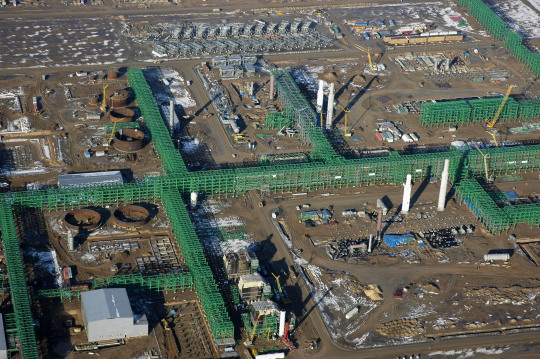
PRECAST PILES
One of our largest works on the Kashagan Development project was the installation of approximately 44,000 concrete piles - approximately 35,000 of which were precast, with the remainder cast in situ.
The piles were coming from various locations within Kazakhstan. One of the largest suppliers had its prefabrication unit in Uralsk, about 600 km North of Atyrau. A railway connects the two cities, but as already mentioned in another chapter, the Russians built the railways for their interests. Therefore, as always, the 600 km not only become almost 1,200, but there was also the crossing the border with Russia, and the return of the train to Kazakhstan. One of the consequences of this ''export/import'' of the piles was that the material had to be cleared through customs, and these operations usually took place at the arrival station of the goods. In our case the station was about 15 km from the construction site, and once cleared through customs the piles could reach the site via a railway link specially built by the Client in anticipation of the transport of crude oil and sulfur with railway tanks.
Thus began one of those "beautiful funny stories" with that Soviet flavor that brightened our Kazakh days. I went with the interpreter to Eskine railway station, where the poles had arrived.

The station was run by a women crew only, and when we entered the old building the smell of borscht soup was filling the air. It was 10.00 am, but the huge clock hang on the wall was showing noon. Through the interpreter I spoke with the station chief - a woman named Sultanat, short, black hair - who told us to come back in the afternoon: now they were having lunch. I asked why they had lunch at that time, and the answer was that all the railways in Kazakh territory respected the Almaty timetable (2,000 km away) otherwise ''There would have been confusion with the train traffic''.
First tentative failed, as per practice in Kazakhstan.
For the second attempt, we showed up at noon. Madame Sultanat listened to us, and then took out from the drawers a series of forms to fill out, about ten in total - naturally each form included signatures and stamps to be collected in various parts of the public administration in Atyrau (40 km away). (Do the could give us the doc's to fill when we met first time?Maybe.........) Being sure that the operation was only just beginning, we said our thanks and returned to site offices.
Third day: we unleashed a couple of drivers around the city, with the forms filled out, stamped and signed by our General Director: Offices whre to collect signatures were the Akimat (Municipality), the Customs Directorate, the KNB (formerly KGB) Office and the Municipal police.
Fourth day: by the evening, we had collected all the required signatures and stamps, so it was decided that the next day we would return to Eskine station.
Fifth day: early in the morning at Eskine station, but (naturally…) Sultanat (means "festival" in Kazakh) is absent!! So? So we will return tomorrow, because without Sultanat nothing can be unlocked.
Sixth day: we are at Eskine station, the station chief is there and a deputy also turns up (who didn't think of helping us yesterday.........) Deputy chief of the station was from Atyrau so she took the opportunity to asks us:
''You also come from Atyrau every day, so I could come with you in the morning, right?''
Yes we are..............(I was expecting such question)
So I may come with you every day
No, you can't come with us….
And why'?
Because there is an insurance problem, in the event of an accident, if you were in a vehicle belonging to our company, there would be big problems for us.
Ahh…daa…kaniashno….
But she didn't seem very convinced by the explanation, and so she finds a way to waste our time further:
''The Customs stamps cannot be read well, and the date on which they were affixed is missing – she said.
So?
I – says the Deputy, whose name is Bibigul (means migratory thrush in the Kazakh language) talking to her chief Saltanat - would not release the material, but if you want to take responsibility………
Since ''peer-to-peer espionage'' has never ceased in the former Soviet countries, the Station Chief rightly fears that her Deputy may one day testify that she ''turned a blind eye to normal procedures'' - so she gives us back the Customs paperwork, telling us to return when the stamps are clearly visible and the dates affixed.
We left the station with that sense of frustration that you feel when faced with the most obtuse bureaucracy, which you would not be able to defeat even with cannon fire.
We returned the following week, with stamps, signatures and dates galore (and with gifts for all the women at the station…) and finally M. Saltanat affixed her stamps and signatures (and dates). So the executive order was given to attach a locomotive and drag the pile train to the site terminal station.
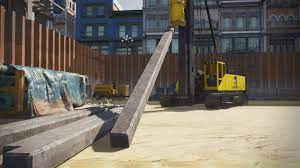

1 note
·
View note
Text
Good afternoon TUMBLR - April 27th - 2024
''Mr. Plant has owed me a shoe since July 5, 1971."
Atyrau Kazakhstan – Dec 2004 – Oct 2010 - Kashagan Development Project
Part 5


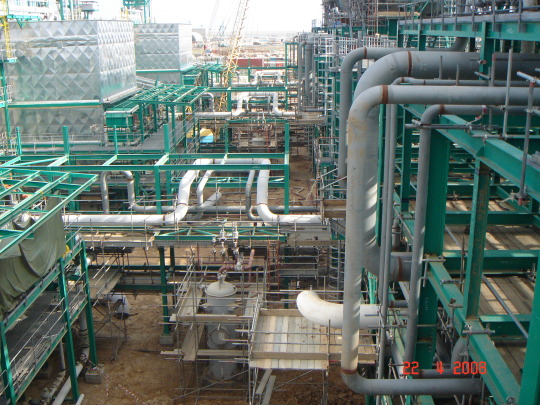
BOILERS ASSEMBLY
Then one day the 47,000 pieces began to arrive in Karabotan, and therefore since we had prepared the foundations, the assembly of boiler B began (which was then followed by C and finally A)
Carmelo Longo was appointed to direct the assembly, supported in the enormous undertaking by a plethora of Romanians and guided by two consultants from MACCHI Italia: Sergio Corami, immediately nicknamed ''malinki'' (the little one) given his height of just over 1 .50 – the second was called Di Napoli, but was from Brindisi. (For the issue of residence VISA, two degrees in Engineering were created specifically for them, but since we were there we spared no expense, and made them ''graduates from the Milan Polytechnic).
Longo's right-hand man was a savvy Romanian, Nicolai Nicolai (you will ask me what his name was and what his surname was? I never knew, and in any case he was always called ''Nicolai Nicolai'')
The work of assembling the boilers proved to be hard and difficult, but truly interesting and very instructive and lasted practically from October 2007 to December 2008. The testing of the boilers took place just before Christmas, and deserves a separate chapter.
WINTER OF 2006-2007
The winter that year was one of the harshest for Atyray region in living memory, according to local elders. Temperatures fell below -40 C for several consecutive days in the presence of snow. A thick layer of ice had consolidated on everything, houses, cars, roads. We remained stuck in the house for three days, after which we were forced to face the 40 kilometers of icy road that separated us from the site. We necessarily had to check the state of the equipment and infrastructure. We received an SOS from our Israeli Client that the diesel powering the power generators had frozen in their camp. Left without electricity, all staff members had moved to hotels in Atyrau. We provided the so-called Arctic diesel and technicians to restart their generators. When we arrived at our logistics base on the construction site, two wolves were stationed near the garbage bins: hunger had driven them to do something they never did, that is, approach the man to look for something to eat. We left for them the remains of mutton and cow bones from our canteen. In those days, news shook the city from the torpor induced by the freezing cold: a marshutka (minibus for transporting people) in service between Atyrau and Dossor had stopped halfway due to a breakdown. Of the ten people on board, four were found frozen in the minibus. Of the other six, only shreds of clothing and a few bones were found far from where the vehicle had stopped. The hypothesis that the police made was that the people had tried to reach on foot a small town a few kilometers away from the bus. The hungry animals of the steppe had wreaked havoc on it.
BOILER TESTING
In Kazakhstan there is what is called the ''construction season'': essentially a time window that goes more or less from March to the end of September. In these months construction activities can get the necessary boost, as the weather is ''clement'' (again considering that during the short Kazakh summer temperatures reach +40 C).
The work schedule must therefore necessarily follow this calendar, otherwise you will suffer technical and organizational difficulties if you want to work even in winter at all costs. Every year AGIP managed to force Contractors to largely miss the summer window: delays in the delivery of materials, delays in approving the works, delays in crucial decisions.
This brought us to the beginning of October, a period in which the Works Management began to send emails and letters in which it attributed - or attempted to attribute - the delays to us Contractors. And immediately afterwards he started the ''hospital plan'' thing. The reasons were always the same:
''You wasted time through your own fault, now send us your plan to make up for lost time for analysis and approval''
This did nothing but waste further time, because once the recovery plan was prepared, it was sent to AGIP where it took weeks before responding with their comments, which then had to be in incorporated into the recovery plans, to be submitted for approval again. So we arrived at the end of October, and the omelette was done: the snow was falling, the frost blocked machines and equipment, the workers were forced to work in freezing temperatures (and wind). Here is explained in a few lines the reasons why the Kashagan project - originally planned for three years, was completed after seven.
In this context, one of the worst experiences of the Kashagan project was when AGIP forced us to test the MACCHI boilers just two weeks before Christmas 2008. The hydraulic testing of a boiler takes place by putting the boiler circuit itself under pressure with water, but this represents a big problem when the outside temperature (during the day) is constantly around -15 C.
To overcome the inconvenience of the possible freezing of the water in the pipes, we devised a stratagem worthy of the Trojan War.
A tubular scaffolding was built all around the boilers (which we remember were more than 40 meters high) and ''tarpoline'' (large water-resistant tarpaulins, originally made of tarpaulin) were spread over this framework. These had to be fire-proof, because fan-coolers powered by both electricity and diesel were placed inside - the fan-coolers had to work 24/7 to guarantee - under the awnings - a temperature of + 3 or 4 degrees C.
Once these temperatures were reached constantly, RIINA inspectors were brought in from Italy for testing. It wasn't easy at all, the enormous quantity of filling water had to be certified, so it was decided to fill only boiler A, and then pour the water into boiler B and then C. But before pouring the water from one boiler to another, new analyzes had to be carried out to confirm that the water had not been contaminated. And then at night a series of guardians had to be left to check that the heating was working, power the diesel fans, check that there were no fires… all, as I remembered before, with freezing external temperatures. In the end we succeeded, and it was a great victory against above all the skepticism of the AGIP Works Management, especially the Italian side, which was waiting for nothing other than our failure to throw the cross on us.
To tell the truth, I have never been able to understand the real reasons why AGIP representatives ''rejoiced'' when a Contractor made mistakes, or failed to deliver a job on time.
1 note
·
View note
Text

Eugène Druet
Auguste Rodin's "Jeunesse triomphante" (1896), circa 1898
55 notes
·
View notes
